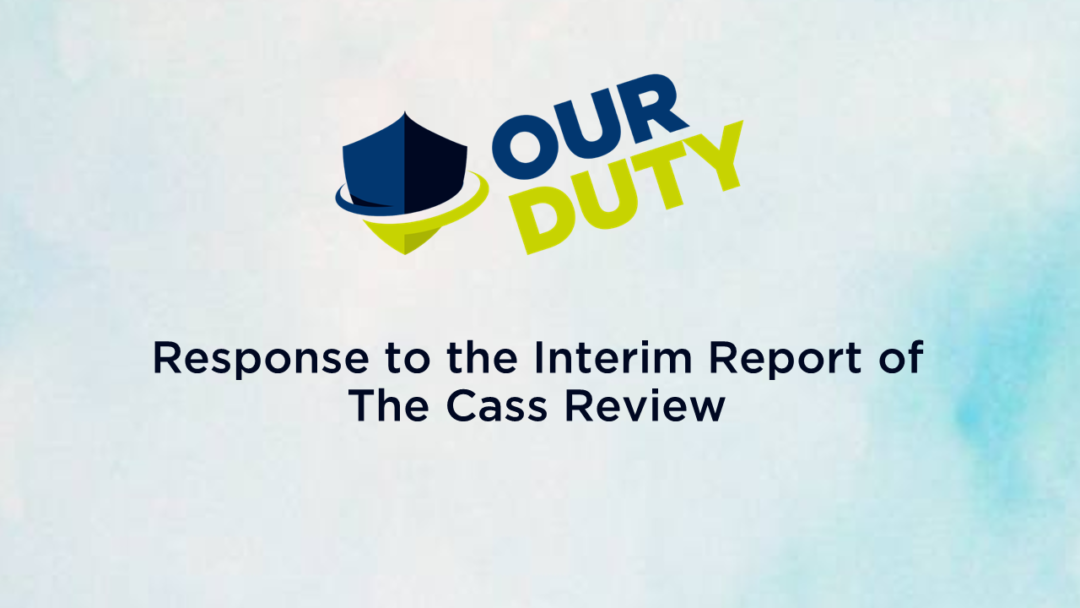This is a response the Interim Report published by The Cass Review.
First up, Our Duty has been calling for an immediate moratorium on the provision of Opposite Sex Imitation Medicine pending the final report from The Cass Review. Nothing in the Interim Report diminishes the rationale for such a moratorium. Indeed, if anything, our case is strengthened.
The second point that must be made is that we welcome this Interim Report. It confirms our view that our children are being failed by the current system. This report is a necessary step towards achieving an Objective Model for the treatment of transgender ideation in children and adolescents. Many hearts and minds must be won over to the idea of a rational, evidence-based approach, and this report seems to be a necessary first step in what we hope is a pathway to complete objectivity.
However, the report seems to lay out two competing approaches – the ‘gender affirmative model’ and the ‘cautious approach’. There is a third way, the Objective Model, which is the approach advocated for by Our Duty.
The ‘gender affirmative model’ is one where a young person’s ‘gender identity’ is affirmed and the young person is put on a medical pathway usually consisting of Opposite Sex Imitation treatments such as wrong-sex hormones and removal of sexual organs.
The ‘cautious approach’ argues for more care and exploration in the diagnosis of gender dysphoria but includes provision that Opposite Sex Imitation might be an appropriate palliative course for some.
The Objective Model relies entirely on scientific evidence. Fundamentally, it rests on the fact that if there is nothing medically wrong with a person’s body then there is no need to alter it. While there is no evidence that the ‘gender affirming model’ is appropriate, then the precautionary principle must lead us to reject it. It is a medical experiment, and one with permanent often catastrophic results.
The Objective Model is one where Opposite Sex Imitation treatments are only available for mature adults of sound mind who pay for it themselves.
We welcome the finding that the Gender Identity Development Service (GIDS) at The Tavistock and Portman NHS Foundation Trust is unsafe. Our Duty has been saying this since our foundation and our vindication in this matter comes as great relief.
We agree that a centralised service is unsustainable, and we would add that a ‘gender affirming’ or ‘cautious’ service will result in continued harm. The proposal for regional centres carries with it a risk that, in seeking to minimise costs, NHS England might seek to leverage the ten ‘pilot’ regional Gender Identity Clinics. This would be a grave error given that these clinics are unequivocally ‘gender affirmative’.
It is reassuring to see attention being given to underlying factors that contribute to transgender ideation, especially childhood trauma, neurodiversity, and homosexuality.
While we welcome a review of the role of endocrinologists, we consider that the role of endocrinologists in the treatment pathway must be restricted to the resolution of abnormal hormone imbalances (which could help with feelings of dysmorphia). The only valid therapeutic use of sex hormones in the treatment of adolescents must be to align their bodies with their actual sex phenotype; they must never be administered for reasons of ‘gender identity’.
The report mentions that the waiting lists for treatment are unacceptably high. We agree. Swift and appropriate talking therapies could result in swift desistance from transgender ideation, which must be the stated goal of any treatment regimen.
The concerns of clinicians are an important input into any treatment protocol. However, we must insist that only the views of ‘gender critical’ clinicians are valid in this debate. The views of transgender clinicians and their allies are tainted with conflicts of interest, especially given the need for ‘validation’ typical of persons with a transgender identity. This matter is clearly one where ideological subjectivity needs to be replaced with scientific objectivity.
In conclusion, we believe it was necessary that The Cass Review publish an Interim Report which might help shift “The Overton Window” towards the objective model our children need. Our welcome for this report is tempered by the belief that it could have gone further, particularly in laying out the case for our children to treated without risk of iatrogenic harm and in an environment devoid of harmful ideology.

